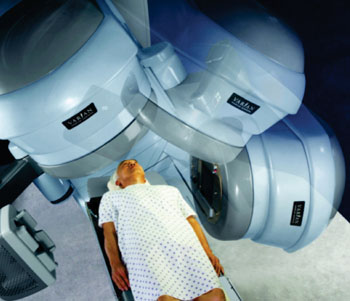Arc Therapy Radiosurgery Faster Than Gamma Knife Treatments
By MedImaging International staff writers
Posted on 03 Dec 2014
Volumetric modulated arc therapy (VMAT) radiosurgery treatments can be optimized to treat multiple brain metastases at the same time, according to a new study.Posted on 03 Dec 2014
Researchers at the University of Alabama at Birmingham (UAB; USA) identified 20 previously treated Gamma Knife (GK) cases involving a total of 112 lesions, and re-planned them using single fraction VMAT RapidArc radiosurgery. The approach is based on using key RapidArc features, including a high-definition multileaf collimator for ultra-fine beam shaping; a high intensity mode for delivering high doses quickly; and jaw tracking technology for extra shielding of normal tissues.

Image: The RapiArc VMAT radiosurgery system (Photo courtesy of Varian Medical Systems).
The UAB approach to RapidArc planning calls for the beam to be delivered using non-coplanar arcs or rotations to maximize the number of treatment angles and enhance precision, as well as optimization criteria that minimizes the amount of low dose fall-off reaching normal brain tissues during treatment. The researchers also developed a predictive model of the 12Gy isodose volume as a function of tumor number and volume.
The results showed that the RapidArc treatment plans for treating multiple tumors are comparable to GK plans in terms of how precisely they can match high doses to the shape of the targeted tumors, as well as minimizing exposure of normal brain tissue outside the treatment area. The researchers also noted that RapidArc treatment for multiple metastases can be completed in 22 minutes, while a comparable GK treatment might take one to five hours, depending on the number of metastases. The study was published in the October 2014 issue of Neurosurgery.
“Brain metastases impact some 170,000 cancer patients in the US each year, and over 70% of those cases involve multiple metastases,” said senior author Prof. John Fiveash, MD, vice chairman for academic programs at UAB. “Using Varian's latest medical linear accelerators and RapidArc technology for VMAT, we can devise treatments that offer the same level of conformity as Gamma Knife technology.”
The RapidArc Radiosurgery system, a product of Varian Medical Systems (Palo Alto, CA, USA), can deliver treatments faster than GK treatments for a variety of reasons, including a dose delivery rate that is at least six times faster, as well as the ability to treat multiple metastases simultaneously, rather than sequentially. The treatments can also be completed using frameless immobilization—without affixing the patient's skull to an immobilization frame—as required for most GK treatments.
Related Links:
University of Alabama at Birmingham
Varian Medical Systems




 Guided Devices.jpg)









